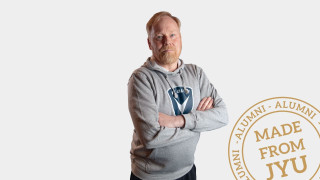JYU alumni Korrapin Lertkittisuk: Research ethics and student well-being - the uniqueness of Finnish education

Originally from Thailand, Korrapin Lertkittisuk participated in various international youth leadership programs that connected her with peers from diverse backgrounds. These formative experiences provided her with a sense of belonging and global understanding, which ignited her passion for gender equality and education for youth development.
Korrapin completed a Bachelor’s in Community Development and further pursued a Master's in Development and International Cooperation, now known as Development, Education and International Cooperation (DEICO), at the University of Jyväskylä graduating in 2019. Her desire to deepen her understanding of development through international collaboration led her to Finland, where she was drawn to the academic excellence and cultural emphasis on well-being. In addition, she gained a solid foundation in research ethics, a skill especially critical in her works involving studies with children and youth.
Research Ethics: A foundation for working with children
In Korrapin’s view, Finland places a strong emphasis on research ethics - not just as a requirement or formality, but as a deeply rooted mindset shared throughout the academic community. Finnish scholars approach research with great care, ensuring participants’ rights are respected at every stage. Even prior to the formal implementation of the General Data Protection Regulation (GDPR) in 2017, participants were well informed about the advantages and disadvantages of research participation and consent procedures were robust.
This culture of ethical awareness sets Finland apart and has had a lasting impact on Korrapin. During her studies in Jyväskylä, she practiced to consistently apply these ethical principles, which now guide her professional work in sensitive settings. Her ethical approach enables her to collect meaningful and trustworthy data while ensuring the protection of all participants.
In her role at UN Women, Korrapin led research involving educators and underage students, prioritizing the protection of children’s rights and ensuring informed consent from both students and their parents. This ethical approach was central to developing context-specific violence prevention curricula tailored to the needs of schools in Thailand. The same principles guide her broader research efforts, including educational research with UNESCO in Southeast Asia, and a study with USAID’s Enhancing Equality in Energy for Southeast Asia (E4SEA) project, where she supported gender equality initiatives involving youth and professionals.
Supportive academic environment that prioritizes well-being
From her first day in Jyväskylä, Korrapin was welcomed by a student tutor who supported her transition to Finland. This tutoring program, organized by the University of Jyväskylä, is designed to help new students adjust after relocating - something she found incredibly helpful and was deeply grateful for. During challenging moments - particularly while completing her thesis, her supervisor, Tiina Kontinen, encouraged her to maintain a healthy work-life balance and reminded her to enjoy life outside the classroom.
My professors genuinely cared for my well-being and encouraged me to experience the joys of different activities and the beauty of nature!
Thanks to this support, Korrapin enjoyed many unforgettable experiences: hanging out with friends, hunting for the northern lights, skiing, and much more. She recalled how professors often asked about students’ lives outside their studies - a reflection of how deeply Finnish educators value student well-being.
As a student from Thailand, Korrapin found this emphasis on well-being both unique and meaningful. It later inspired her own research interests, particularly in learning and well-being. For example, during her time as a UNESCO Youth Researcher (2020–2022), she contributed to a regional study on learning and well-being among youth in Southeast Asia.
Finland as a role model for education
According to Korrapin, Finnish education is not focused solely on grades, but on supporting each student’s individual development. This creates a low-pressure learning environment that fosters both academic growth and essential life skills like collaboration, time management, and critical thinking.
Through this learning process, I developed collaboration and communication skills that strengthened my ability to work in teams and, more importantly, to respect others.
She credits her supervisor as a role model for compassionate teaching. When struggling with how to analyze and present her data, Korrapin was met with understanding, not criticism. Tiina acknowledged her efforts and guided her step by step - an experience that shaped Korrapin’s belief in the importance of empathetic, empowering education.
Her time at JYU has had a profound impact on her skills, personal growth, and professional outlook. The university’s emphasis on ethics, well-being, and supportive learning continues to shape her work and strengthen her commitment to fostering inclusive, equitable societies.
Inspired by the Finnish education system, Korrapin actively applies these principles in her own work - striving to create lasting, meaningful change for future generations!







